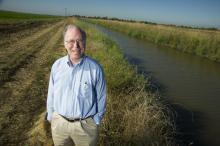The Department of Geography extends our congratulations to MA in Geography alum Jay Lund, who was formally inducted into the National Academy of Engineers last fall! Dr. Lund currently serves as director of the Center for Watershed Sciences and Ray B. Krone Professor in the department of civil and environmental engineering at the University of California, Davis. Here, Dr. Lund looks back at his time in the geography department and the impact of studying geography on his career.
On the professional goals and deciding to pursue the MA degree in geography: When I arrived at UW, I intended to become a scholar on urban social geography broadly, with a lot of economics, sociology, anthropology, and political science - perhaps a professor. I began as a teaching assistant for Geography 100. At the time, we were given almost complete freedom in the discussion sections, which essentially meant teaching our own course within a course. This was challenging, but I really enjoyed it. It forced me to decide what was important and communicate it effectively to students.
The election of Ronald Reagan as President helped me understand the profound difficulties of urban planning and applied urban social geography in the US, compared to northern Europe for example. Observing that almost 100 applicants for each open faculty position also helped me understand the fragility of aspirations for an academic career.
So as I completed my geography MS thesis, I recycled myself as a BS student in civil engineering, completing both in 1983. These classes were easy in a sense because almost all questions had only one answer that could be found by deduction. But they were pleasantly analytical and sharpening in this way. It was a good (indeed a great) complement with geography. As someone who enjoys sailing, I shifted focus a bit from housing and transportation issues to water, and took several courses on optimization methods, which fit well with the economics I had taken. My career plan at the time was to become a coastal engineer and sail up and down the coast consulting on beach and shore protection projects - this plan failed.
As I was completing these BS and MA degrees, the instructor of my stochastic optimization class (Richard Palmer) asked if I was interested in graduate school. So I had a funny story to tell him about already being a graduate student in geography. His PhD was from Johns Hopkins' department of Geography and Environmental Engineering, the dominant academic-oriented PhD program in water systems engineering at the time. He thought my geography MA would allow me to go directly into a PhD program. Having a serious, but not yet that serious, girlfriend in Seattle led me to apply only to the UW PhD program, thinking that the trade-off was that I would never become a professor. We've been married almost 34 years and I became a professor of both engineering and geography at UC Davis, so this worked out unimaginably well.
On UW geography faculty and research: In geography, I worked mostly with [Jonathan] Mayer, but also had some great classes with Richard Morrill and Bill Beyers. Jon really helped me learn how to write and be reasonable in my expectations. He set a great example of a broad integrative scholar not lost in methodological gobbledygook. This was the intellectual skill-set I wanted to cultivate. He was very patient. I am eternally grateful. My thesis on the liveaboard population of Seattle took me 3 years (overlapping with the time needed for me to complete the engineering BS). But it was a lot of fun. I did a lot of field interviews on boats around Seattle. Almost every interviewee offered me a beer. The classes were good and useful, but the teaching and thesis research really inspired me.
On current research and teaching at UC Davis: I always work on a wide range of topics. The world has so many interesting problems, and writing about them sharpens my thinking and engagement. I work mostly on water management problems, bringing together traditional water engineering with economic and optimization ideas and methods. I also bring in a lot of policy, which brings in the breadth of social geography that I saw at UW. The books and papers I work on, with many students and others from many disciplines, have been more readable and useful as a result.
I like cute technical problems that have management implications as well as wicked gnarly public policy problems that have many sides and nuances, but which also need timely improvements.
Today, I work more on how to organize scientific and technical activity to be more effective in a political policy world. It is hard to change public policies, where thousands to millions must agree or acquiesce before a change can be made. But I've been lucky enough to work with the right water and environmental issues at times when changes were seen to be needed, and some changes have occurred. Today I also work on a range of more technical problems with policy implications, such as climate change adaptation, improved environmental management, groundwater management, and rural water supply.
On the impact of geography on current work: Geography and engineering have a lot in common as integrative disciplines that draw heavily and synthesize from the universe of other fields. Both fields bring in ideas and information from whatever field has information, methods, or modes of thought that are insightful for our particular problem or region. Many infrastructure systems and issues are also inherently geographical. Combining these two somewhat differently-focused integrative disciplines has made me a better geographer and a better engineer. This has helped my students, scholarship, and public engagement in countless ways.
